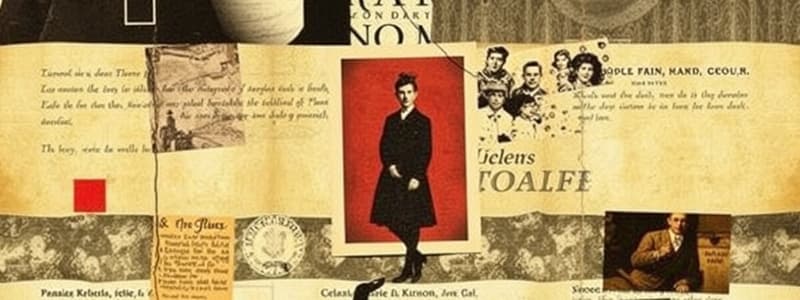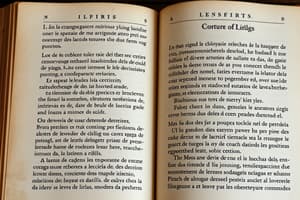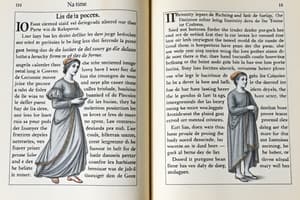Podcast
Questions and Answers
What is 'De lo que acontecío a un mancebo que se casó con una mujer muy fuerte y muy brava' about?
What is 'De lo que acontecío a un mancebo que se casó con una mujer muy fuerte y muy brava' about?
A medieval text in Spain showcasing traditional gender roles and a chauvinistic viewpoint.
What is the main theme of 'Hombres Necios que acusaís'?
What is the main theme of 'Hombres Necios que acusaís'?
- Support for women's rights (correct)
- Traditional marriage
- Humor in relationships
- Men's superiority
What does 'Peso Ancestral' symbolize?
What does 'Peso Ancestral' symbolize?
The emotional weight and stress that women carry due to men.
What historical context does 'Mujer Negra' refer to?
What historical context does 'Mujer Negra' refer to?
What is the plot of 'Dos Palabras'?
What is the plot of 'Dos Palabras'?
What does 'Visiones de los vencidos' depict?
What does 'Visiones de los vencidos' depict?
What is the significance of 'Segunda Carta de Relación'?
What is the significance of 'Segunda Carta de Relación'?
What genre is 'Lazarillo de Tormes' and what does it satirize?
What genre is 'Lazarillo de Tormes' and what does it satirize?
Flashcards are hidden until you start studying
Study Notes
De lo que acontecío a un mancebo que se casó con una mujer muy fuerte y muy brava
- Medieval Spanish text that explores traditional gender roles.
- Centers on a man's perception of power over his strong-willed wife.
- Reflects a chauvinistic attitude, treating the wife as inferior.
- Major theme emphasizes the importance of establishing identity and expectations early in relationships.
Hombres Necios que acusaís
- Satirical work from the New Spain era emphasizing feminist perspectives.
- Critiques men's ungrounded accusations towards women.
- Highlights contrasting societal views of women, such as prostitutes vs. the idealized 'angel of the house.'
- Provocatively questions the morality of both women who sell themselves and the men who purchase sex.
Peso Ancestral
- Explores the emotional burdens women carry, symbolized as a heavy weight.
- Emphasizes the stress from men's expectations and suffering.
- Incorporates imagery of heaviness to depict women's emotional experiences.
- Feminist critique of societal norms and the weight of gender roles.
Mujer Negra
- Poem set against the backdrop of the slave trade and post-Cuban Revolution.
- Tells the story of an African American woman on a plantation experiencing sexual exploitation.
- Highlights themes of racial prejudice and the oppression of women.
- Ends on a hopeful note of freedom, symbolizing resilience and hope for the future.
Dos Palabras
- Short story about a destitute family stripped of identity.
- A mother seeks employment by learning words from a dictionary, embodying resourcefulness.
- Features a dramatic turn when she is kidnapped by a political candidate needing her help.
- Classifies as Magical Realism and emphasizes a woman's empowerment in a patriarchal society.
Visiones de los vencidos
- Describes Aztec fears of impending Spanish conquest.
- Enumerates ominous signs perceived by the Aztecs, such as columns of fire and eclipses.
- Illustrates the cultural confrontation and differing worldviews between the Aztecs and Spanish colonizers.
Segunda Carta de Relación
- Written by Hernán Cortés, detailing plans for the conquest of Tenochtitlan.
- Describes his approach to the Aztec king, presenting gifts and promises of peaceful conversion.
- Juxtaposes promises against the violent reality faced by the Aztecs during the attack.
- Reflects on the clash of civilizations and the use of euphemism to soften the narrative of conquest.
Lazarillo de Tormes
- Recognized as a foundational picaresque novel, blending comedy with social satire.
- Chronicles the life of Lazaro, a young boy navigating a harsh and deceptive society.
- Highlights themes of survival and class critique through Lazaro's encounters with various guardians, including an abusive blind man.
Studying That Suits You
Use AI to generate personalized quizzes and flashcards to suit your learning preferences.



